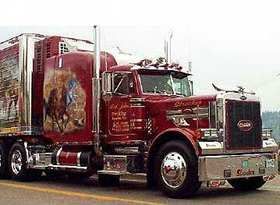Owner Operator
Topic 19815 | Page 1

Damon...correct me if I am wrong; you are only in trucking school.
As a rule we highly discourage anyone from L/O or O/O until they have at least one year of experience. Considering the myriad of trials and tribulations you have yet to conquer, running a business in an industry you know little about is a risky undertaking.
There are plenty of threads on the subject... use the search bar in the upper left of this page to find them.

No I have my CDL but I'm in the military can't go OTR yet
CDL:
Commercial Driver's License (CDL)
A CDL is required to drive any of the following vehicles:
- Any combination of vehicles with a gross combined weight rating (GCWR) of 26,001 or more pounds, providing the gross vehicle weight rating (GVWR) of the vehicle being towed is in excess of 10,000 pounds.
- Any single vehicle with a GVWR of 26,001 or more pounds, or any such vehicle towing another not in excess of 10,000 pounds.
- Any vehicle, regardless of size, designed to transport 16 or more persons, including the driver.
- Any vehicle required by federal regulations to be placarded while transporting hazardous materials.
OTR:
Over The Road
OTR driving normally means you'll be hauling freight to various customers throughout your company's hauling region. It often entails being gone from home for two to three weeks at a time.

Roger understood that's the plan I'm just trying to get information and understanding on the 2 different types of O/O
Damon...correct me if I am wrong; you are only in trucking school.
As a rule we highly discourage anyone from L/O or O/O until they have at least one year of experience. Considering the myriad of trials and tribulations you have yet to conquer, running a business in an industry you know little about is a risky undertaking.
There are plenty of threads on the subject... use the search bar in the upper left of this page to find them.

In my opinion it's to expensive to lease a brand new truck. I think buying an older truck on your own and working for a company is the better choice between the two. Keep in mind an older truck most likely won't be under warranty and repairs come out of your pocket. But a brand new truck will be close to $1000 a week or you can get a decent used truck for $1000 a month. Say you put the difference of $3000 a month in the bank to handle repairs, in just a few months you'll have a pretty good amount. If you happen to have no major breakdowns you will be in good shape to upgrade to a newer truck at some point if that is your goal.
Most owner operator companies require experience, which is definitely in your best interest anyway. Start out as a company driver for sure as a new driver starting out.
Owner Operator:
An owner-operator is a driver who either owns or leases the truck they are driving. A self-employed driver.
If you happen to have no major breakdowns you will be in good shape to upgrade to a newer truck at some point if that is your goal.
But of course keep in mind that the words, "I'm gonna sell this old, reliable money-making machine" have never been spoken, soooo..........

The only way you can contract your own loads as an O/O is if you are running under your own DOT authority. Most O/O that I deal with buy their trucks and lease on to a company that has a DOT authority. Its cheaper for them because then they are only required to purchase bob tail insurance for when they are hitch to that company's trailer, when they are they are covered under the company's Auto liability insurance.
DOT:
Department Of Transportation
A department of the federal executive branch responsible for the national highways and for railroad and airline safety. It also manages Amtrak, the national railroad system, and the Coast Guard.
State and Federal DOT Officers are responsible for commercial vehicle enforcement. "The truck police" you could call them.

Don't fall for the "we pay for xxxxx" you are the one paying for those "free" items in the form of lower rates. Tricky little buggars they are.
HOS:
Hours Of Service
HOS refers to the logbook hours of service regulations.New Reply:
New! Check out our help videos for a better understanding of our forum features

















Preview:








 TT On Facebook
TT On Facebook
I see Company Sponsored Owner Operators how is this different from getting your own truck off of the market. I also see companies that say they will pay for your fuel if you drive O/O for them. It seems like with Company Sponsored O/O your almost like a company driver with benefits and of course paying for the truck. Are you allowed to contract your own loads outside of your current situation?
Owner Operator:
An owner-operator is a driver who either owns or leases the truck they are driving. A self-employed driver.